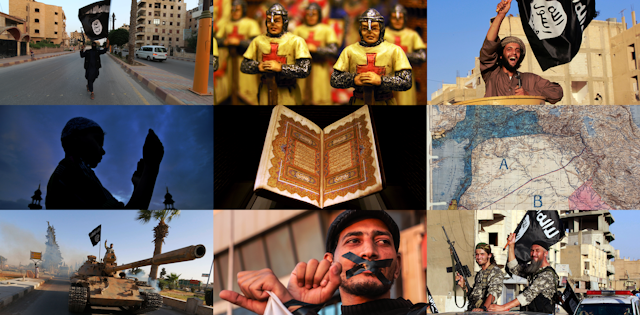Since announcing its arrival as a global force in June 2014 with the declaration of a caliphate on territory captured in Iraq and Syria, the jihadist group Islamic State has shocked the world with its brutality.
Its seemingly sudden prominence has led to much speculation about the group’s origins. How do we account for forces and events that paved the way for Islamic State’s emergence?
Do the answers lie in the 20th century, which saw the fall of the Ottoman Empire, the creation of new nations in its wake and their struggle for independence as well as articulation of national identities? Is it hidden in the debris of the Gulf and the Iraq Wars? Or do we have to look deeper in history – to the fundamental tenets of Islam, the Crusades, or the so-called Assassins of the 11th to 13th centuries?
Which of these – if any – can be said to have created the conditions necessary for the rise of Islamic State? In the article kicking off our series on the genesis of the group, professor of modern Middle Eastern history James Gelvin cautions against easy answers. Just because one event followed another, he says, doesn’t mean it was also caused by it.
It is far better to look at the interplay of historical and social forces, as well as recognising that outfits such as Islamic State often cherry-pick ideas to justify their beliefs and behaviours.
Heeding his advice, our series on understanding Islamic State attempts, in a dispassionate way, to catalogue many of the forces and events that can arguably have played a part in creating the conditions necessary for these jihadists to emerge. We have tried to spread the net wide, but make no claim to being comprehensive or having the final word on Islamic State’s origins.
After Gelvin’s broad introduction to the group and warnings about the misuse of history, we turn to Islam and its theology.
Historian of Islamic thought Harith Bin Ramli explains how Islamic State fits – or doesn’t – in Muslim theological tradition, before religious studies scholar Aaron Hughes asks why, given the jihadist group is based on religion, is it so violent?
In a further contribution, Hughes discusses the plurality at the core of Islam, accounting for why the religion is so different in different countries.
Next, we turn to medieval history, as both the Crusades and the so-called cult of Assassins have been linked to Islamic State.
Farhad Daftary discusses the Nizari Ismailis – romanticised as Assassins by the Crusaders and in The Travels of Marco Polo – who killed, among others, two early caliphs. Could they really be thought of as an earlier incarnation of the most vicious terrorists in recent history?
Professor of religious studies Carole Cusack considers the Crusades themselves, and what contribution they could have had in Islamic State’s origins.
Leaping to the 20th century, we start looking at the more proximate causes of the group’s rise.
First, a look at the fateful Sykes-Picot agreement, which craved up the Middle East into English and French spheres of influence, and was denounced by Islamic State in the first video it released. James Renton argues the group’s self-declared political aim in establishing its caliphate speaks directly to the deal, and is an attempt at post-colonial emancipation.
Addressing an issue raised in the comments to the articles in the series, Harith Bin Ramli considers the long 20th century endured by the Middle East. He explains how the crisis of political authority in the Muslim world between the fall of the Ottoman Empire and the 1991 Gulf War contributed to Islamic State’s rise.
The series concludes with a look at more proximate events – the role of the recent wars in the region and their aftermath. Greg Barton points out that to understand Islamic State, we need to look not just at the Middle East itself but also at the complicated role the West has historically played in it.
Download our special report: Understanding Islamic State

